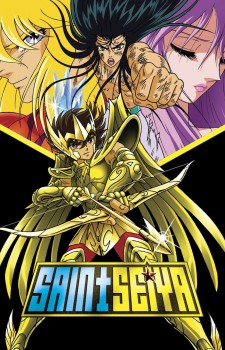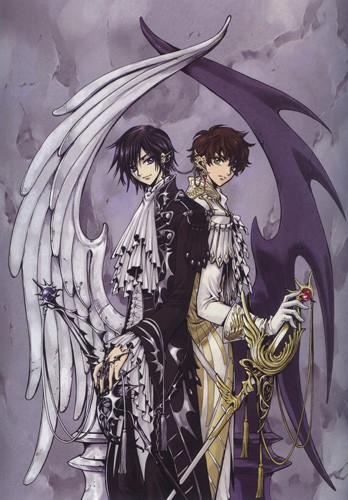From the very beginning, Code Geass approached Lelouch and Suzaku’s characterization through the usual simple comparison: black and white. Even the official arts usually depict them in black and white. After all, opposites attract—or do they?
Except it turns out that they both were never as simple as black and white.
Lelouch, portrayed as the exiled Prince who roused and later led the rebellion against Britannia in Japan’s favor, even though he was no Japanese. He was ruthless, very manipulative, and would do absolutely anything to find out who his Mother’s killer was, and to create a world that his sister, Nunnally, wished for. It was clear from the early episodes that Lelouch was not the hero-type main character—even his charismatic persona, Zero, embodied this image perfectly; an all-black costume that commanded both fear and respect. The Black Prince, if you would.
In contrast, Suzaku was portrayed as the antithesis of Lelouch. He was what the hero should be, a perfect image of a white knight in shining armor (or on a white horse, take your pick). He was the kind of person who would pause in the middle of battle to save a civilian in danger, the one who would be the first to raise his hand when it comes to protecting those who are innocent and powerless, to support peace and justice. The symbolism gets even more perfect once he was appointed as an actual knight by Euphemia and his knight costume consisted of pure white robes—a clear contrast to Lelouch’s black Zero.
But it has never been that easy. With Lelouch, we were shown clearly the ‘grey areas’ in his personality—the Lelouch out of the Zero mask was not a lie. He genuinely cares about his friends, he cried when he made the decision to kill Euphemia and grieved for the loss of his friends throughout the series, most notably for Shirley and Rolo’s deaths. Lelouch knew his methods would kill people and never denied that he sullied his hands, which is an honesty in itself. Gradually, as it was more prominent in R2, Lelouch changed the definition of black and white in the audience’s minds, especially after the events in the Sword of Akasha, and Lelouch willing to take the responsibility for the world’s tomorrow. In the end, Lelouch closed the story as a King clad in white, a clear opposite from how he’d been wrapped in black in the beginning of the series.
On the other hand, with Suzaku, breaking down his character isn’t as easy as it is with Lelouch. The White Knight in question, as the story progressed, turned out to be the one filled with lies, to the world and to himself. His hero-complex is such that his actions are always impulsively self-sacrificing, bordering on suicidal, as he so often put himself in dangerous situations that might get himself killed. Unlike Lelouch, Suzaku never stopped to question himself, he just went with whatever happened. It’s after Euphemia’s death that we began to see how shrewd Suzaku really is; he lies, to himself and the world, how he wished for redemption and how he justified the murder of his father. And in a true opposite of Lelouch’s White King in the end, Suzaku’s stage closes with him putting Zero’s black cape and mask.


 Yae Kugayama
Yae Kugayama
 Koto Kataku
Koto Kataku







 You can read more about Magical Nurse Witch Komugi-chan R on our site
You can read more about Magical Nurse Witch Komugi-chan R on our site 



























 ']
']
 ']
']
 ']
']
 ']
']
 ']
']
 ']
']
 ']
']








 ' text=" 37 votes " text_position=""]
' text=" 37 votes " text_position=""]
 ' text=" 40 votes " text_position=""]
' text=" 40 votes " text_position=""]
 ' text=" 51 votes " text_position=""]
' text=" 51 votes " text_position=""]
 ' text=" 72 votes " text_position=""]
' text=" 72 votes " text_position=""]
 ' text=" 89 votes " text_position=""]
' text=" 89 votes " text_position=""]










 ' anime='
' anime=' ']
']

 ' anime='
' anime=' ']
']

 ' anime='
' anime=' ']
']

 ' anime='
' anime=' ']
']

 ' anime='
' anime=' ']
']

 ' anime='
' anime=' ']
']

 ' anime='
' anime=' ']
']

 ' anime='
' anime=' ']
']

 ' anime='
' anime=' ']
']

 ' anime='
' anime=' ']
']


 ' text="Why Lelouch and Suzaku is Your Most Frustrating OTP" text_position="aligncenter"]
' text="Why Lelouch and Suzaku is Your Most Frustrating OTP" text_position="aligncenter"]












